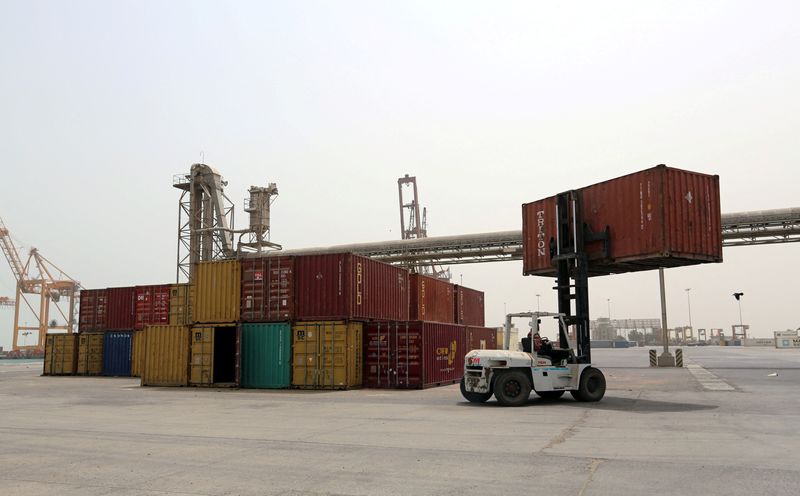(Reuters) -Attacks on vessels by Iranian-backed Houthi militants in Yemen have disrupted international commerce on the shortest shipping route between Europe and Asia.
The attacks, targeting a route that accounts for about 15% of the world's shipping traffic, have pushed several shipping companies to reroute their vessels.
The U.S. and Britain launched dozens of air strikes against Houthi military targets overnight on Jan. 11 and 12 in retaliation for the attacks, widening regional conflict stemming from Israel's war in Gaza.
Below are companies' responses to the disturbances (in alphabetical order):
AB FOODS
The Primark-owner is monitoring the situation, but its supply chains are capable of some adjustment, a company spokesperson said, adding that so far it sees no need to be concerned.
BP (LON:BP)
The oil major on Dec. 18 said it had temporarily paused all transits through the Red Sea.
DANONE
The French food group said in December that most of its shipments had been diverted, increasing transit times. Should the situation last beyond 2-3 months, Danone will activate mitigation plans, including using alternate routes via sea or road wherever possible, a spokesperson said.
DHL
The German logistic company, which does not operate ships but uses them to transport containers, on Jan. 8 advised its customers to take a close look at how they manage inventories.
ELECTROLUX
The Swedish home appliance maker has set up a task force to find alternative routes or identify priority deliveries to try to avoid disruptions. It sees a limited impact on deliveries for now.
EQUINOR
The Norwegian oil and gas firm on Dec. 18 said it had rerouted vessels that had been heading towards the Red Sea.
ESSITY
The maker of brands such as Libresse and TENA said it was staying in contact with impacted suppliers to ensure continued flow of goods, but added the impact on its business was limited.
EUROPRIS
The Norwegian retailer, which imports 35-40% of goods sold from Asia via sea freight, on Jan. 5 said it had not considered other shipping options as this would increase costs. It said longer shipping times were within its safety margin and no significant challenges were expected.
FEDEX
The U.S. parcel delivery giant said on Jan. 14 it hasn't seen much of a shift to air freight due to disruptions in the Red Sea.
GEELY
Geely, China's second-largest automaker by sales, said on Dec. 22 its EV sales would likely be impacted by a delay in deliveries, as most shipping firms it uses to export EVs to Europe reroute ships around Africa.
IKEA
The Swedish ready-to-assemble furniture retailer on Dec. 19 said the situation would result in delays and may cause availability constraints for certain products. "We are evaluating other supply options to secure the availability of our products," it said.
KONE
The Finnish elevator maker said the situation may in some cases delay shipments, but most of its customer deliveries should stay on schedule. Kone said it had prepared for the disruptions by seeking alternative delivery methods and routes.
LIDL
Lidl unit Tailwind Shipping Lines, which transports non-food goods for the discount supermarket chain and goods for third-party customers, said it was sailing around Africa for now.
MOSAIC
The U.S. fertilizer company said on Dec. 18 it had rerouted a couple of U.S.-bound shipments around Africa.
NEXT
The British clothing retailer's CEO on Jan. 4 said sales growth would likely be moderated if disruptions continued through 2024. He said Next, which sources the majority of its products from Asia, could mitigate this through earlier ordering or using some air freight.
QATARENERGY
The world's second largest exporter of liquefied natural gas has stopped sending tankers via the Red Sea although production continues, a senior source with direct knowledge of the matter told Reuters on Jan. 15.
SAINSBURY'S
Britain's second largest grocer said on Jan. 10 it was in regular contact with the UK government about the Red Sea disruptions.
"We're making sure that we plan the sequencing of product from Asia Pacific so that we get products in the right order," CEO Simon Roberts said, noting that long term contracts with shippers "mitigate any cost impact as far as possible".
TARGET
A source familiar with the matter told Reuters on Jan. 12 the U.S. retailer is experiencing some disruptions of shipments from India and Pakistan, a big region for apparel manufacturing, calling the effect "minor" overall.
TESLA
The U.S. EV maker will suspend most car production at its factory near Berlin from Jan. 29 to Feb. 11 due to a lack of components caused by shifts in transport routes.
TRACTOR SUPPLY
Deliveries for the U.S. retailer have been delayed anywhere from two to 20-plus days, the company's chief supply chain operator said on Jan. 12.
TSMC,
The world's top contract chipmaker said on Dec. 19 it did not anticipate a significant impact on its operations.
VOLKSWAGEN
A company spokesperson said on Jan. 12 the German carmaker does not expect "significant" restrictions to production.
VOLVO CAR
The Swedish automaker said on Jan. 12 it would halt production at its plant in Belgium for three days due to delays caused by the situation in the Red Sea.
WHIRLPOOL
The appliances maker said in December it was closely monitoring logistics issues in the region to help mitigate risks as they arise, adding there was no impact to its business so far.

YARA
The Norwegian fertilizer maker told Reuters it was only mildly impacted, though the Red Sea is an important supply route for the company.